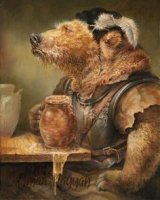- Posts: 10451
- Thank you received: 70
Jack London The Road
- Blazer Bob
-
 Topic Author
Topic Author
- Mountain Legend
-

Less
More
09 Dec 2014 18:59 - 09 Dec 2014 18:59 #1
by Blazer Bob
Jack London The Road was created by Blazer Bob
Did you know that in 189something thousands of hobos marched on Washington to demand free stuff. I didn't.
In fact I do not know anything about that era. In spite of that this is a good read.
I admit when I think of Jack London I think of "Call of the Wild".
My kindle told me he wrote some SF. I had no idea.
"The Road is Jack London's collection of stories from his life as a hobo. In this entertaining collection of tales and autobiographical essays, London relates every aspect of the hobo's life -- from catching a train to cadging a meal. The wealth of experiences and the necessity of having to lie for a living brought depth London's subsequent stories. In "The Road," Jack London relates the tricks that hobos used to evade train crews, and reminisces about his travels with Kelly's Army. Jack London later credited his story-telling skill to the hobo's necessity of concocting tales to coax meals from sympathetic strangers. (less)"
www.goodreads.com/book/show/54455.The_Road
"Jack London was a lifelong fantast. The first money he ever received as a professional writer was for the science fiction story "A Thousand Deaths" published by The Black Cat in 1899. Thirteen of his 188 published short stories and four of his twenty-two novels fall readily into the category, and other stories contain fantastic elements.
London explored numerous styles of science fiction: pre-history, apocalyptic catastrophe, future war, scientific dystopias, technocratic utopias. Running through most stories are the ideas of social evolution, racialism, and anti-capitalism. In some stories, London emphasizes "social science fiction," the problems of society, particularly the exploitation of workers and the materialism of capitalism. By positing extreme cases of social order or disorder, he hopes to convey how human suffering based in economic inequality may be eliminated. In other cases, his imaginary societies were meant to demonstrate the validity of Social Darwinism with its emphasis upon the rise of the superior Anglo-Saxon race.
London's science fiction shows the influence of such horror fantasy writers as Mary Shelley and Edgar Allen Poe, and the popular science fiction writers of the late 19th century, H.G. Wells, Jules Verne, H. Rider Haggard, and Stanley Waterloo. Themes already familiar to turn-of-the-century readers reoccur in London's stories: invisibility, humans turned into beasts, worldwide pestilence, cataclysmic war, indefinable terrors, ghosts, time travel, extra sensory perception (this, before the term was even in the vocabulary)."...
london.sonoma.edu/Students/scifi.html
I downloaded this.
The Jack London Science Fiction Megapack: The Complete Science Fiction and Fantasy of Jack London
by Jack London
In fact I do not know anything about that era. In spite of that this is a good read.
I admit when I think of Jack London I think of "Call of the Wild".
My kindle told me he wrote some SF. I had no idea.
"The Road is Jack London's collection of stories from his life as a hobo. In this entertaining collection of tales and autobiographical essays, London relates every aspect of the hobo's life -- from catching a train to cadging a meal. The wealth of experiences and the necessity of having to lie for a living brought depth London's subsequent stories. In "The Road," Jack London relates the tricks that hobos used to evade train crews, and reminisces about his travels with Kelly's Army. Jack London later credited his story-telling skill to the hobo's necessity of concocting tales to coax meals from sympathetic strangers. (less)"
www.goodreads.com/book/show/54455.The_Road
"Jack London was a lifelong fantast. The first money he ever received as a professional writer was for the science fiction story "A Thousand Deaths" published by The Black Cat in 1899. Thirteen of his 188 published short stories and four of his twenty-two novels fall readily into the category, and other stories contain fantastic elements.
London explored numerous styles of science fiction: pre-history, apocalyptic catastrophe, future war, scientific dystopias, technocratic utopias. Running through most stories are the ideas of social evolution, racialism, and anti-capitalism. In some stories, London emphasizes "social science fiction," the problems of society, particularly the exploitation of workers and the materialism of capitalism. By positing extreme cases of social order or disorder, he hopes to convey how human suffering based in economic inequality may be eliminated. In other cases, his imaginary societies were meant to demonstrate the validity of Social Darwinism with its emphasis upon the rise of the superior Anglo-Saxon race.
London's science fiction shows the influence of such horror fantasy writers as Mary Shelley and Edgar Allen Poe, and the popular science fiction writers of the late 19th century, H.G. Wells, Jules Verne, H. Rider Haggard, and Stanley Waterloo. Themes already familiar to turn-of-the-century readers reoccur in London's stories: invisibility, humans turned into beasts, worldwide pestilence, cataclysmic war, indefinable terrors, ghosts, time travel, extra sensory perception (this, before the term was even in the vocabulary)."...
london.sonoma.edu/Students/scifi.html
I downloaded this.
The Jack London Science Fiction Megapack: The Complete Science Fiction and Fantasy of Jack London
by Jack London
Last edit: 09 Dec 2014 18:59 by Blazer Bob.
Please Log in or Create an account to join the conversation.
- otisptoadwater
-

- Mountain Legend
-

Less
More
- Posts: 7923
- Thank you received: 70
09 Dec 2014 19:16 #2
by otisptoadwater
I can explain it to you but I can't understand it for you.
"Any man who thinks he can be happy and prosperous by letting the Government take care of him; better take a closer look at the American Indian." - Henry Ford
Corruptissima re publica plurimae leges; When the Republic is at its most corrupt the laws are most numerous. - Publius Cornelius Tacitus
Replied by otisptoadwater on topic Jack London The Road
Thanks for the information, sounds like an interesting read! 
I can explain it to you but I can't understand it for you.
"Any man who thinks he can be happy and prosperous by letting the Government take care of him; better take a closer look at the American Indian." - Henry Ford
Corruptissima re publica plurimae leges; When the Republic is at its most corrupt the laws are most numerous. - Publius Cornelius Tacitus
Please Log in or Create an account to join the conversation.
- Blazer Bob
-
 Topic Author
Topic Author
- Mountain Legend
-

Less
More
- Posts: 10451
- Thank you received: 70
09 Dec 2014 19:20 #3
by Blazer Bob
Very. I got it from Amazon for cheap but it is in the public domain. I just paid because I have adopted to my device but not to reading a book on my computer.
Replied by Blazer Bob on topic Jack London The Road
otisptoadwater wrote: Thanks for the information, sounds like an interesting read!
Very. I got it from Amazon for cheap but it is in the public domain. I just paid because I have adopted to my device but not to reading a book on my computer.
Please Log in or Create an account to join the conversation.
- FredHayek
-

- Mountain Legend
-

Less
More
- Posts: 30729
- Thank you received: 179
10 Dec 2014 07:07 #4
by FredHayek
Thomas Sowell: There are no solutions, just trade-offs.
Replied by FredHayek on topic Jack London The Road
Thanks for the tip. I got it for free and bought a bundle of Jack London's novels for only $1.
Read White Fang and Call of the Wild as a kid and it will be interesting to check out his other work as an adult.
Read White Fang and Call of the Wild as a kid and it will be interesting to check out his other work as an adult.
Thomas Sowell: There are no solutions, just trade-offs.
Please Log in or Create an account to join the conversation.
Time to create page: 0.152 seconds







